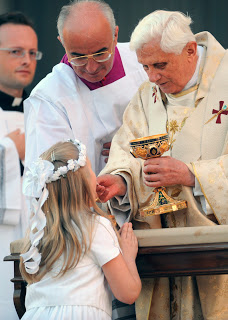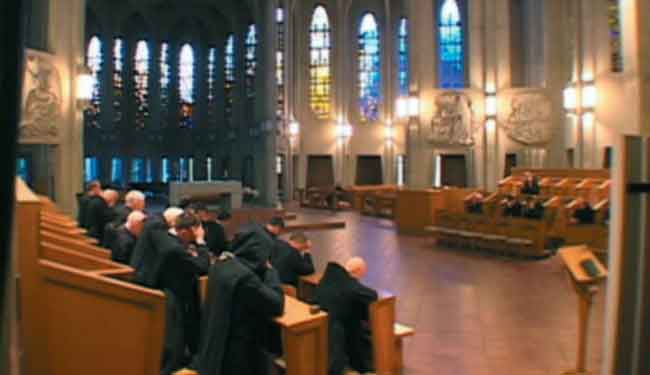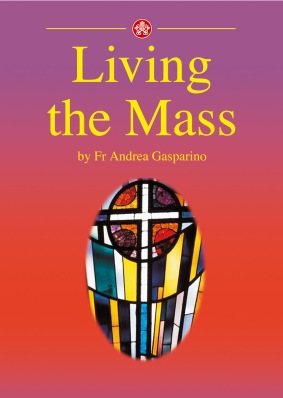If a child were about to receive first Holy Communion and asked, “What do I do when I receive the Eucharist?” what would you tell him or her? If you had to spend 30 minutes in prayer, what would you do? Would you know how to spend that time?
I received my first Holy Communion when I was 14 and I asked, “What do I do when I receive the Eucharist?” The answer was, “Talk to God.” Which meant it turned out to be a really short conversation, because I didn’t know how to and what to talk about. So for years I would receive Communion and not know how best to pray.
When I got to the seminary, we had morning meditation every day at 6 a.m. and 30 minutes of personal prayer were painful! During my prayer, I would go through a list of people, asking God to bless them, but the only problem with that was there were still 25 minutes to go!
Are you happy with the way you pray after receiving Holy Communion? Communion here lasts about ten minutes, so it can be ten minutes of boredom or ten minutes of growth and real prayer!
Today, it struck me that Jesus “went up the mountain by himself to pray” (Mt 14:23). Was He bored, falling asleep, or looking around distractedly? Of course not. One reason is because He surely knew how to pray. As a devout Jew and a rabbi, He knew how to pray the psalms, He knew how to spend the whole night in prayer.
While praying over this truth, I realized this week that every time I grew in prayer it was because I learned how to pray. When I was bored during that morning meditation, I went to my spiritual director and he suggested that I go through a spiritual book slowly, and ponder what God was saying to me through the book. This helped a lot!
For 15 years now, every day, twice a day, 15 minutes each time, I’ve been doing the Examen of St. Ignatius of Loyola. It’s so fruitful because I learned the method of this prayer.
You can’t play basketball without knowing how to dribble and shoot. You can’t drive without knowing how to drive. You can’t speak another language without knowing the words. Same with prayer. Many give up prayer because they just don’t know how to pray.
I want to teach you a method of prayer for when we receive Communion, which I learned last year and changed how I received Communion. This is important because every time we come to Mass and receive Communion we will have ten minutes to pray. This little booklet, “Living the Mass,” page 11, gives an amazing analogy. It says we should receive the Eucharist like we receive a friend who comes to visit our home. There are four steps: 1) Celebrate our friend’s arrival; 2) Offer him something to eat and drink; 3) Sit and talk; 4) If we need his help, then ask.
- So, as soon as we receive Jesus, let’s close our eyes, and in our hearts and minds we “begin by celebrating…. Express all your joy to Christ because you are meeting with him again.” Use your imagination; imagine Jesus is arriving at your house at the front door. We’d be so excited and say, “Welcome! Thanks for coming! It’s so good to see you! I don’t deserve to have you come here, so thanks for coming!”

- When Jesus comes in let’s “offer something. But what? Something that will please God! Try to come to Holy Communion with a gift already ready: an act of charity… and… after Communion, offer a future act to Christ…. Offer something important to Christ, something that costs a lot, a courageous gift, some service given to the poor or old or sick person. A charitable action carried out within your own home is especially valuable.”
- “Listen!… He has something important to say to us…. He is always speaking to us but we fail to pick up the receiver, and he waits, because he never infringes on our freedom…. After every Communion we should be able to say exactly what God told us…. We should be able to say: ‘God said this to me.’” I think we should talk with Jesus about what’s important to Him. Have we ever thought about it that way? What’s Jesus thinking about? What’s on His mind? Surely pleasing His Father. Let’s talk to Him about today’s readings, and then about what’s going on in our life: our joys, struggles, the rest of the day.
- Now we can ask Him for something. “Above all, we must ask to do his will.”
Every prayer at the beginning is a little difficult. Push through the difficulties of repetition. Just like new languages, sports, learning a new musical instrument, it’s hard at the beginning, but with practice, we’ll see improvement.
We can’t pray unless we know how to pray. We now have a plan, and having a plan makes prayer fruitful.